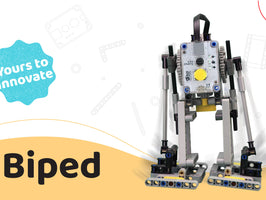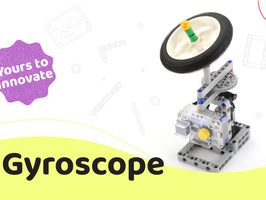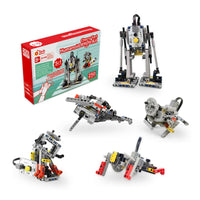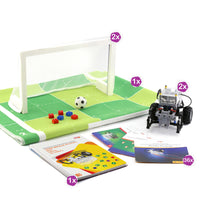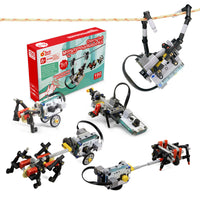Introduction
Tower cranes are one of the primary machinery in every under-construction project from the early stages until the end as they can raise hundreds of feet in height along with the construction. Their main objective is to lift and deliver the building materials to where they’re needed.
Here, we have made a fully functional desktop replica of a tower crane out of Lego Technic parts, Arduino boards, cable mechanisms, 3D printed parts, off-the-shelf DC gear motors, and addressable RGB LEDs (Fig. A).

The horizontal structure called boom is connected to the vertical one through a revolving joint that allows a 360-degree rotation, which provides maximum coverage on the construction site (Video clip B).

When the crane carries loads, to balance out the moments about the revolving joint, the boom is equipped with a counterbalance weight, which is commonly made out of concrete. The counterbalance weight is placed at the rear end of the boom. In this replica, all of the electronic and electromechanical elements, including the Arduino Mega board, 2 L298 DC motor drivers, and 4 DC gear motors, are integrated. They are placed at the rear end to produce the natural counterbalance weight for the crane. In addition, a Lego-made box filled with steel screws is hanged from the rear side of the boom to provide the remaining needed counterbalance weight.
The tower cranes are also equipped with a trolley that horizontally moves on the boom. The trolley movement is controlled by an electric gear motor and a cable mechanism (Video clip C). Tower cranes usually have hooks for lifting objects, where connecting loads to the hook is usually done by manpower. However, the current replica is equipped with a gripper mechanism to enable a crane operator to remotely grip the objects (Video clip D). The vertical and horizontal motions of the gripper are shown in video clip D.



The current tower crane comes with a controllable gripper that can grip loads off the ground with no external assistant required (Video clip E). The jaws of the gripper are hanged from two parallel cables where each cable’s tension is controlled via a separate gear motor. This mechanism enables the gripper to go up/down and to open/close by loosening/tightening both cables in one direction or opposite directions, respectively. Video clip E demonstrates the functionality of the tower crane.

The operator can remotely control the whole tower crane via a remote control console made with an Arduino Nano, two joystick modules, and an NRF communication module (Video clip F).

And last but not least, the tower crane is equipped with some addressable color RGB LEDs mounted on both vertical and horizontal structures to replicate the actual hazard lights on any real-world model. These RGB LEDs create a stunning outlook to the replica especially in dark rooms (Video clip G).


